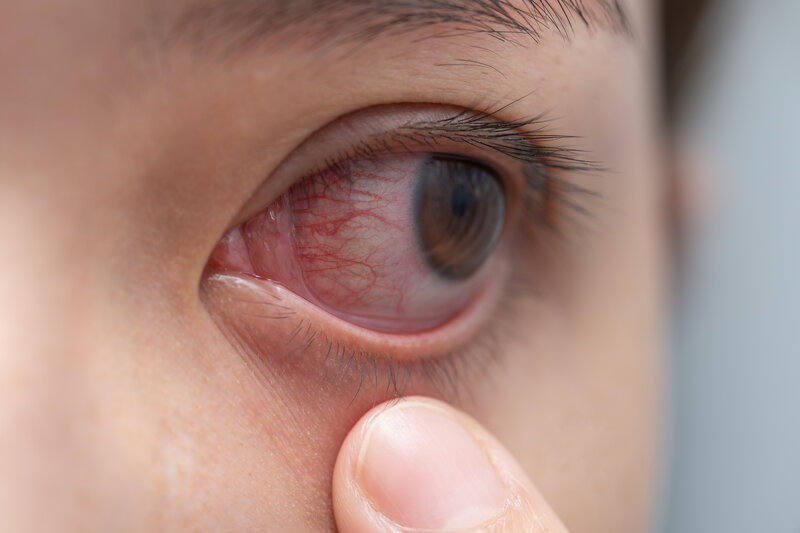Posted by: Atlantic Eye Institute in Education

Herpes simplex viruses are highly contagious and can quickly spread to the eyes. While there are two types of herpes simplex viruses, 1 and 2, the first simplex is most readily spread and causes infections of the face. Herpes Type 1I is thought to live in roughly 90% of the population, most of whom contracted it during early childhood.
Typically, herpes simplex 1 viruses cause fever blisters on the lips, also called cold sores. However, in some cases, the infection migrates to the eye, requiring immediate treatment from an ophthalmologist rather than an optometrist. Because herpes viruses can affect the cornea, leading to corneal scarring, antiviral treatments are essential to prevent the severity of an infection.
Note: Herpes simplex 2 is a sexually transmitted disease that rarely causes eye infections.
Herpes Simplex Eye Infections: How To Tell The Difference
If you’re prone to getting fever blisters, especially when you are sick, stressed out, or are overly exposed to the sun, you most likely carry the herpes simplex 1 virus. Those who are susceptible to herpes simplex 1 carry it in their bodies, where the virus remains dormant in tissue cells until activated. Therefore, anything that compromises the immune system, or a weakness in affected tissue, has the potential to activate the virus.
The most common sources of viral activation of the herpes simplex 1 virus are:
- Illness or a fever
- Strong sunlight or cold wind
- Direct trauma to the affected tissue
- Stress
- Menstruation
- Certain types of medication
- Suppressed immune system
Once a lesion or blister is apparent, you are contagious. As long as you have a blister or lesion on your lips, you can spread it to others via touch, kissing, or sharing drinks. Unfortunately, you can also spread it to other parts of the body, such as your eyes, by rubbing your eyes or touching the surrounding eye tissue after touching or making direct contact with an active blister or lesion.
When the virus makes its way to your eye, it will most likely infect the eyelid, conjunctiva (outermost membrane of the eye), and the cornea. Infections deeper inside the eye are less common.
Symptoms Of A Herpes Eye Infection (Herpes Keratitis)
Herpes eye infections, also called herpes keratitis, are similar to other types of eye infections. However, they are often more painful, and, because they risk scarring of the cornea, we recommend seeking treatment ASAP rather than waiting for an infection to clear on its own.
Symptoms of an eye infection caused by herpes include:
- Eye pain or discomfort
- Burning in the eyes
- Redness
- Rash
- Blurred vision
- Light sensitivity
- Tearing
- Discharge
- Fever
- Sores or lesions on lips or gums
Most herpes infections are superficial, affecting only the eyelid or the exterior lining of the eye. However, corneal infections may become more serious, resulting in scarring that permanently affects vision.
Herpes Keratitis Treatment
Because a virus, rather than bacteria, causes herpes keratitis, optical antibiotics drops will not work. You must get an accurate diagnosis of the eye infection so we can rule out bacterial infections and pass them directly to antiviral treatments. Again, we want to emphasize that herpes eye infections are more severe than more common eye infections, requiring attention from an ophthalmologist. The wrong treatment can worsen the infection and lead to permanent corneal scarring.
Minor infections
Patients with minor herpes keratitis infections go home with antiviral drops or ointments that must be applied as directed. If we feel the infection is tipping into the “moderate” level, we may also prescribe steroid eye drops to reduce inflammation and increase the effectiveness of the antiviral medications. We’ll keep in touch with you and make sure your eye(s) respond to treatment. If not, we’ll get you in ASAP to evaluate the next steps.
Moderate infections
If the herpes eye infection isn’t responding as fast as we’d like, or you come in with an infection already progressed to the “moderate level,” we may prescribe antiviral medications for a more whole-body and systemic approach to the infection. Your ophthalmologist may also decide to remove some of the infected tissue from the eye. For this, we use numbing drops and then gently scrape the cornea to remove affected cells, lowering the viral load of the eye, and giving the treatment a head start.
Severe infections
Severe infections will be treated as above, using a combination of treatment approaches. We will remain in continuous contact with you, paying careful attention to potential vision loss. In severe cases, when the infection went too long before treatment, patients may have corneal scarring. This is only corrected via laser eye surgery to remove scarring or by replacing affected areas of the cornea using donor tissue. Sometimes, a complete corneal transplant is necessary.
There Is No Official Cure For Herpes Eye Infections
If you’ve never had a herpes simplex 1 infection before, this is your unfortunate welcome to a permanent club. Unfortunately, there is no official cure for herpes infections. The viruses remain dormant in the body until activated. Once you’ve had an infection, you’re more prone to future lip or eye infections. The better you take care of your body by making healthy diety and lifestyle choices, the less often herpes is activated, and the swifter your body can fight off infections when they do flare up.
Atlantic Eye Insitute Treats Herpes Eye Infections Quickly
Are you worried your eye infection is herpes-related? Don’t hesitate to schedule an appointment with the exceptional team at Atlantic Eye Insitute. Our office is proud to offer comprehensive diagnosis and treatment by an elite team of optometrists and ophthalmologists. We guarantee accurate diagnosis and immediate treatment to reduce the symptoms and side effects of herpes keratitis as soon as possible.



